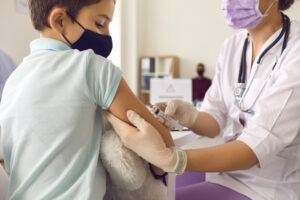Millions more people will be offered booster jabs to maximise protection against the Omicron variant as ministers insisted that Britain will have a “great Christmas”.
Sajid Javid, the health secretary, said that people should continue with Christmas plans as normal and that the government was “nowhere near” imposing further restrictions. He argued that a turbo-charged booster programme would deal with the new variant.
All adults will become eligible for third doses much sooner than planned as vaccine chiefs prepare to cut the gap between doses, with fresh guidance expected within days. Javid promised a new policy “imminently” and said he had told the NHS to be ready to administer far more vaccines every day.
Laws requiring facemasks in shops and public transport, along with new quarantine rules for all travellers into Britain, will come into effect at 4am tomorrow. Ministers said that this was a “proportionate” response to the emergence of a variant that scientists believe may be the most dangerous yet.
Conservative backbenchers are pressing for an early vote on the rules after Javid suggested that parliament may not get a chance to approve the changes until after they are reviewed in three weeks. Ministers have said that the introduction of measures such as working from home and vaccine passports, which are strongly opposed by many Tory MPs, do not require a vote.
Social distancing rules “came with a really heavy cost on the economy, on people’s social lives and their mental health”, Javid said yesterday. While not ruling them out permanently, he said that “we are not there yet, we are nowhere near that”.
Travel restrictions would “buy time” for more vaccinations, Javid said. He added that an announcement could be made today as the government sought to make the most of a “window of opportunity” before Omicron spread.
So far, 17.6 million people have had booster jabs. Yesterday 450,480 doses were administered, and the programme is averaging 2.5 million a week.
Over-40s are eligible for booster jabs but the programme is slowed down by a requirement to wait six months between second and third doses, which vaccine advisers believe will lead to longer-lasting protection.
After the emergence of Omicron, Javid has asked the Joint Committee on Vaccination and Immunisation to report this week on whether this gap can be reduced. Professor Anthony Harnden, deputy chairman of the committee, signalled yesterday that it would back this plan.
“There’s a very strong argument for raising the antibody level in the whole of the community, and so accelerating the booster programme both by extending the age range and by reducing the interval between the second dose and the booster dose will be a sensible strategy,” he told the BBC.
Harnden said that Omicron was a “variant of considerable concern” and that vaccination remained the main defence despite fears that the jabs would be less effective than against previous strains. “There is a possibility that there will be a degree of vaccine escape and so the higher antibody levels that you have in your bloodstream to fight this particular variant, the better,” he said.
Javid said that his plan for “boosting the booster programme” was the most effective way to deal with Omicron. “The vaccines are still going to give you more protection than otherwise and that is why the booster programme is so important,” he told Sky News.
He will chair a meeting today of G7 health ministers to co-ordinate global efforts against the variant.
Professor Peter Openshaw of Imperial College London backed cutting the gap between doses. “Eight to 12 weeks can be ideal for the next dose. It may not be necessary to wait five or six months to get that booster effect,” he said.
Read more:
Covid-19 vaccine: Boosters for every adult in bid to save Christmas
















